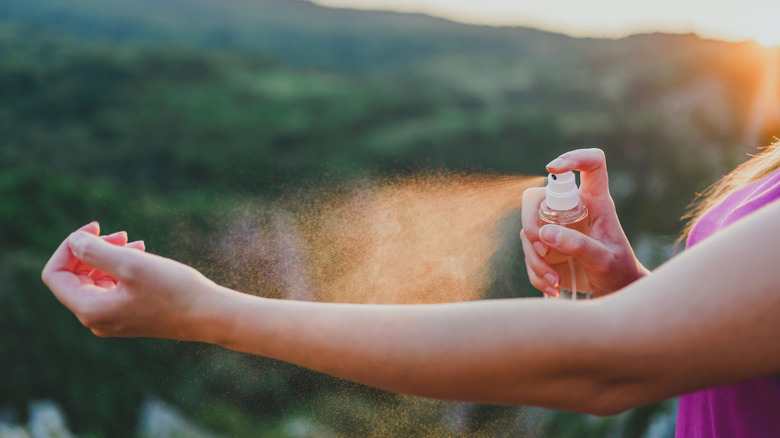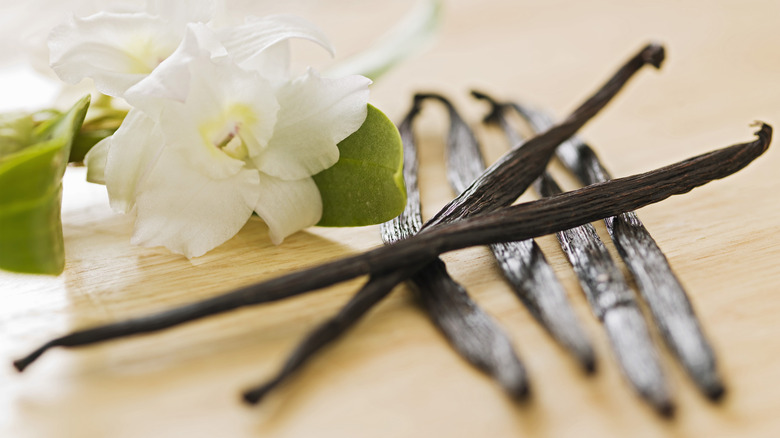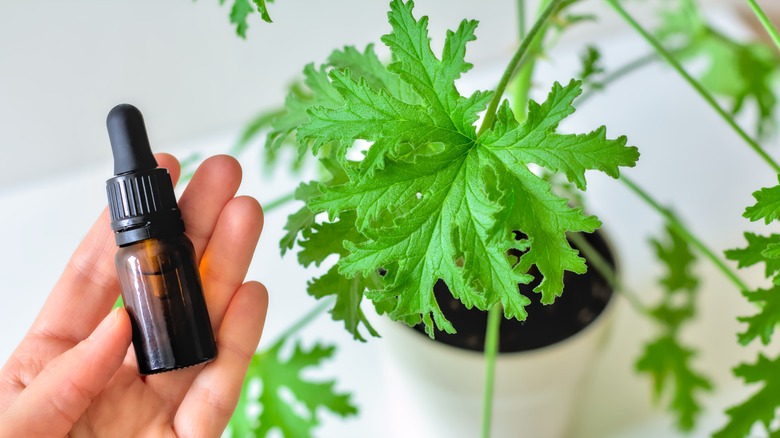The Baking Staple That'll Make The Ultimate Insect Repellant For Camping
While you probably won't do any baking on your next camping adventure, you don't want to forget this essential kitchen ingredient to keep pests away — vanilla extract. As kooky as it sounds, this mouthwatering extract is known to confuse and disorient blood-sucking insects that leave behind those itchy bites. Before we go any further, we should note that vanilla extract is best used as a bug repellant in places not known to have active bear populations, as the sweet scent can attract a curious (or hungry) bear, so exercise caution!
For many people, these bites can be incredibly uncomfortable and even swell into large welts. But as annoying as these insects are, bug repellent can be even worse. Draping ourselves in clouds of sticky, chemical-smelling spray is about as much fun as flossing. Most of us would rather put something more natural on our skin.
While you can't use vanilla extract to get out of basic dental hygiene, you can definitely use it before your next hike or while hanging around the campfire. Besides being a useful bug repellent, it also smells great and won't irritate sensitive skin or damage plastics and synthetic fabrics like bug spray can. But how does this magical brown bean juice work, and what's the best way to apply it? Read on to learn more.
How to use vanilla extract to keep bugs away
If you haven't smelled vanilla extract recently, we invite you to rummage through the back of your cabinets to find a bottle of the good stuff and give it a whiff. Amazing, right? Well, luckily for us humans, we're among the few species that think so. Some bugs (like mosquitoes, flies, ticks, and gnats), on the other hand, don't have as much appreciation for it. This is because bugs are attracted to our natural body odor, but when we cover it up with the vanilla scent, they get confused and are less likely to snack on us.
However, if you use vanilla extract, be sure it's pure and not imitation. It also cannot have other additives in it, such as sugar. Otherwise, this will have the complete opposite effect. You'll be the equivalent of a walking, talking vanilla cake at a 5-year-old's birthday party in the forest. Fun for the bugs, but not for you.
Once you've acquired the correct product, add 1 teaspoon per cup of water and place it in a spray bottle. You can apply this directly to your skin before you go out and reapply throughout the day as needed. If you're especially sensitive to bug bites and want to be sure you're protected, there is also some evidence that vanillin (the chemical compound that gives vanilla its smell) can actually enhance the effectiveness of other natural bug repellents by making them evaporate slower.
Other natural repellents you can use to keep away insects
As it happens, vanilla is not the only scent you can use to keep the creepy-crawlies away. There are loads of scents that are perfectly safe to apply to the skin. You can use essential oils like lavender, peppermint, and thyme as natural repellents. Just be sure to dilute these with water, as the scent can be overwhelming and even irritating in its pure form.
If you've got a green thumb, you can plant natural repellents in your own garden and simply rub the leaves on your skin. If you're going the DIY route, consider citronella (a popular natural bug repellent), lemongrass, or mint plants, like spearmint and peppermint. Mint plants are great to keep around since they not only smell great and can be used in the kitchen, but they're also prolific growers. Just be sure to keep it contained to a pot; otherwise, you might end up with a garden full of mint and nothing else.
You can also go online and just search for natural repellent products that use a combination of scents to keep bugs away. These might contain other scents less common than vanilla or mint, such as neem oil, lemon eucalyptus, or geranium. As you will find with any natural repellent, your mileage may vary, so you may need to try a couple different kinds or combinations to see what works best for you.


